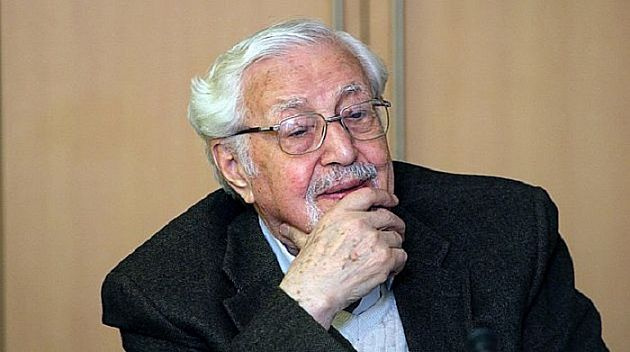Remembering Ebrahim Yazdi

For all those dedicated to the attainment of real democracy, the name and life of Ebrahim Yazdi is a precious legacy worth reflecting upon because it has so much to teach us today. Among those who struggled for an Iranian future that was Islamic, genuinely democratic, and humanly decent no one was more steadfast and clear about their commitment than Dr. Yazdi. He participated in the revolution that overthrew the Shah long before its victory was achieved, and yet he vigorously opposed the radicalizing tendencies that led to the take over of the Iranian governing process at the time of the seizure of the American Embassy in Tehran in November 1979.
I first met Dr. Yazdi in the middle of 1978 when he led a group of student activists at an event organized at Princeton University where I was a faculty member. It was my first encounter with the religious wing of the overseas movement opposed to the Shah. I had been previously supportive of those opposing the American interference in the internal affairs of Iran, a reality that existed ever since 1953 when the CIA played such a major role in the overthrow of the elected government of Mohammad Mosaddeq. Until meeting with Dr. Yazdi I had not adequately appreciated the role of Ayatollah Khomeini as the real leader of this extraordinary revolution unfolding in Iran that seemed to be growing stronger each day.
Some months later I had the opportunity to meet Ayatollah Khomeini in Paris, and was impressed at the time by his seeming commitment to resume a religious life and let post-Shah Iran be run in Tehran by political figures dedicated to establishing a humane relationship between the Iranian state and its people. I was struck by the degree to which the moderate views of Dr. Yazdi seemed to also inform the outlook of Ayatollah Khomeini, as well as Mehdi Bazargan, who had been my host during a political visit to Iran just prior to the meeting in Paris.
Dr. Yazdi was an early supporter of [Ayatollah] Khomeini’s leadership and encouraged a post-Shah governing process that would be guided by a strong constitution and led by officials selected by the people at free elections. However, this moderate vision of the Islamic Republic of Iran was opposed by various hardline elements in the [Ayatollah] Khomeini entourage. The views of Dr. Yazdi seemed to win out at first, but gradually lost out, being decisively rejected after the embassy seizure that led to his resignation as Foreign Minister and Deputy Prime Minister of the Interim Government that had been appointed by Khomeini to run the country immediately after the revolutionary victory. No one has yet clarified whether Dr. Yazdi was correct in thinking that [Ayatollah] Khomeini was undecided as to how post-Shah Iran should be governed until around the time of the hostage seizure, which had been provoked by the Shah’s admission to the U.S. supposedly for medical treatment, although others suspected Washington’s counterrevolutionary intentions..
Rather than disappear from the political arena after removing himself from authority, Dr. Yazdi entered the opposition, forming a political party, the Freedom Movement of Iran, which was dedicated to the democratizing of Iran. He even sought the presidency as the party’s candidate in 2005. It is a tribute to Dr. Yazdi’s courage and perseverance that he never lost faith in this democratizing mission, and believed that despite all the adverse Western criticisms of the Iranian government, the people of Iran were increasingly learning, and even practicing, the true virtues of democracy, and more significantly, that this pattern of practice was slowly transforming the reality of the Islamic Republic of Iran in desirable directions.
It is this faith in the Iranian people and the related conviction that democracy, if it is to take root, must be grown and nurtured from within a country and in harmony with its distinctive political culture that is the core belief of Dr. Yazdi. As such, Dr. Yazdi’s view clashed with America’s ‘international liberalism’ that acted as if democracy could be imposed from without, a position that reached its disastrous climax by the attack on and occupation of Iraq after 2003, an intervention justified under the banner of ‘democracy promotion.’
Dr. Yazdi was sentenced to prison by a military court during the Shah’s rule for anti-government activity and then imprisoned in Iran under similar charges, being released only after an international campaign appealed to Iranian authorities on grounds of health. What Dr. Yazdi leaves us with is the profound political message that not only can an Islamic orientation toward governance be combined with democratic pluralism, tolerance, constitutionalism and a receptivity to all that modernity has to offer, but that is must be so combined if humane governance is to be achieved for Iran and other countries seeking to embed the best of their political culture in their political institutions.
A crucial part of this message, which few have so far grasped in the West, is that this process of democratization is presently being learned by the Iranian people and many of their leaders despite the past mistakes and abuses of the regime, and that democracy will arise when there a convergence of ethics, religion, and politics takes place.
Dr. Yazdi’s interpretation of Iranian developments is being dangerously obscured in the West by the current aggressive postures adopted and inflammatory propaganda disseminated by Israel, Saudi Arabia, and the United States. We who wish for peace and justice can only hope that Dr. Yazdi’s vision comes to prevail in Iran and is respected by the world, and especially by the United States. Although his lifelong preoccupation was Iran, Dr. Yazdi’s engagement with democracy has universal applicability, and never more than now, and not only in the Islamic world, but wherever people seek to live together in a spirit of mutual respect and understanding.
* The words in bracket were added by Iranian Diplomacy editorial staff.

